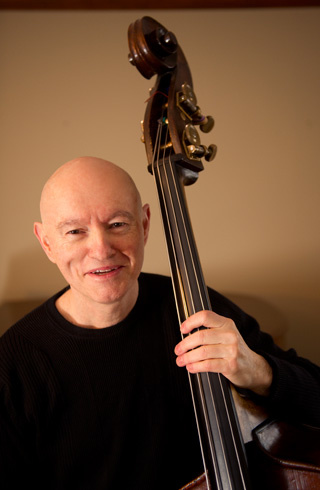Mark Bernat has long wanted to perform the six cello suites by Johann Sebastian Bach in one marathon concert, only on Bernat’s instrument of choice, the double bass.
In 2013, Bernat will have the opportunity to play Bach back-to-back-to-back-to-back-to-back-to-back.
Bernat, an accomplished double bassist who coordinates the performing arts component of Project Art at University of Iowa Hospitals and Clinics, will perform the recognizable solo compositions Sunday, Feb. 17 at the University of Wisconsin-Eau Claire and again during the International Society of Bassists Convention 2013 in June at the Eastman School of Music in Rochester, N.Y.
Bernat is no stranger to Bach’s six suites. In the late 1990s, he recorded an album, released on MAD Recordings, that documents his double bass performance of each suite. The recording supplements Bernat’s transcription of the suites, widely regarded as the definitive edition among double bassists. “The other day I was feeling a bit peppy, so I got it done in just under two hours,” Bernat says. “I’m sure when I actually perform, I’ll stop after the third suite, drink something with caffeine, rosin the bow, and continue.”
Suite 1 in A Major – Gigue
Performed by Mark Bernat
suite_1_in_a_major_-_gigue.mp3
Firefox users: Please note that Firefox does not yet support HTML5 audio controls for mp3 files. Please click on the mp3 link(s) above to listen to the audio file(s).
But recording an album of the six suites versus playing them consecutively before a live audience presents a unique challenge that has long intrigued Bernat.
“As far as I know, no one has performed all six suites,” Bernat says. “Why am I doing it? Playing the suites is like meditation for me. And playing them all is like running a marathon: running a couple of miles—or in these terms, playing just one suite—only feels like a warm-up. Each suite goes deeper musically; they become progressively more complicated.”
The suites are physically and mentally demanding. Bernat thinks the time is right, considering his physical abilities, experience, and maturity, to do this sort of demanding performance.

“I hope the wind is blowing the right way for me on that day,” Bernat says with a laugh. “Bach is some of the most difficult music, and I’ll be doing the suites all from memory. As long as I can play Bach from memory, it will delay senility.
“If you get off track playing Bach, God help you,” Bernat continues. “But that’s all part of the fun. It’s OK to die a little bit on stage; I just want to enjoy the moment!”
While this particular performance looms as a challenge, Bernat is no stranger to the performance world. He has appeared in major concert halls in the United States, Europe, Israel, and China. Bernat trained at the High School of Performing Arts in New York City and the Juilliard School.
While still in his 20s, he gave recitals at London's Purcell Room and Carnegie Recital Hall in New York. As the youngest member of the Israel Philharmonic, Bernat worked with notable conductors such as Zubin Mehta and Leonard Bernstein. He also joined the Jerusalem Symphony as principal bassist under the direction of Lukas Foss.
Bernat found himself attracted to music right away, even finding rhythm in common household appliances.
“At a very young age, I began to have a physical reaction to any sort of repetitive rhythms, including our washing machine—that’s what my parents told me, anyway,” Bernat says. “At age 3, I graduated to the accordion, which was not so unusual, considering I was born in Poland. At about age 8, I started fooling around with a school bass, and I fell in love with it. I reacted to it immediately, and I’m still doing it.”
If Bernat’s double bass could speak, it certainly could tell some stories. “I’m the very proud owner of a 1678 Guadagnini double bass,” Bernat says. “It was born around the same year as Bach. I’d like to think Bach crossed paths with the bass! This instrument is a work of art.”
Bernat came to the UI four years ago to serve in the aforementioned Project Art role. In addition to incorporating more performances for patients and visitors to enjoy at UIHC, Bernat formed a faculty/staff orchestra and a concert band.
“The faculty/staff orchestra began with a handful of string players—four years later, our December concert featured nearly 50 musicians,” Bernat says. “We did a huge program—real symphonic stuff. The level of playing continues to improve. For many of these doctors, nurses, and other medical staff, they commit to doing this because it’s a great release for them.”